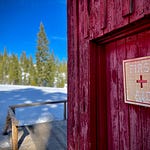[Quick note #1] Go to 12:05 to fast-forward past Gospel reading and jump into the homily if you’d like:)
[Quick note #2] These podcasts are typically only available to paying subscribers and Patreon members. HOWEVER, everything I publish between now and the beginning of May is available to everyone, so enjoy!
Fifth Sunday in Lent
John 11:1-45 - The Death of Lazarus, Jesus the Resurrection and the Life, Jesus Weeps, Jesus Raises Lazarus to Life, The Plot to Kill Jesus
(Check out all the readings for the week here.)
Those lectionary people are sadistic... This week, we have forty. Five. Verses. This spans not three stories like last week (which was a wall of text in themselves), but FIVE stories wrapped into one!
Here it is, the Holy Gospel, according to John (scroll down beyond the reading to see the homily)…
The Death of Lazarus
11 Now a certain man was ill, Lazarus of Bethany, the village of Mary and her sister Martha. 2 Mary was the one who anointed the Lord with perfume and wiped his feet with her hair; her brother Lazarus was ill. 3 So the sisters sent a message to Jesus, “Lord, he whom you love is ill.” 4 But when Jesus heard it, he said, “This illness does not lead to death; rather it is for God’s glory, so that the Son of God may be glorified through it.” 5 Accordingly, though Jesus loved Martha and her sister and Lazarus, 6 after having heard that Lazarus was ill, he stayed two days longer in the place where he was.
7 Then after this he said to the disciples, “Let us go to Judea again.” 8 The disciples said to him, “Rabbi, the Jews were just now trying to stone you, and are you going there again?” 9 Jesus answered, “Are there not twelve hours of daylight? Those who walk during the day do not stumble, because they see the light of this world. 10 But those who walk at night stumble, because the light is not in them.” 11 After saying this, he told them, “Our friend Lazarus has fallen asleep, but I am going there to awaken him.” 12 The disciples said to him, “Lord, if he has fallen asleep, he will be all right.” 13 Jesus, however, had been speaking about his death, but they thought that he was referring merely to sleep. 14 Then Jesus told them plainly, “Lazarus is dead. 15 For your sake I am glad I was not there, so that you may believe. But let us go to him.” 16 Thomas, who was called the Twin, said to his fellow disciples, “Let us also go, that we may die with him.”
Jesus the Resurrection and the Life
17 When Jesus arrived, he found that Lazarus had already been in the tomb four days. 18 Now Bethany was near Jerusalem, some two miles away, 19 and many of the Jews had come to Martha and Mary to console them about their brother. 20 When Martha heard that Jesus was coming, she went and met him, while Mary stayed at home. 21 Martha said to Jesus, “Lord, if you had been here, my brother would not have died. 22 But even now I know that God will give you whatever you ask of him.” 23 Jesus said to her, “Your brother will rise again.” 24 Martha said to him, “I know that he will rise again in the resurrection on the last day.” 25 Jesus said to her, “I am the resurrection and the life. Those who believe in me, even though they die, will live, 26 and everyone who lives and believes in me will never die. Do you believe this?” 27 She said to him, “Yes, Lord, I believe that you are the Messiah, the Son of God, the one coming into the world.”
Jesus Weeps
28 When she had said this, she went back and called her sister Mary, and told her privately, “The Teacher is here and is calling for you.” 29 And when she heard it, she got up quickly and went to him. 30 Now Jesus had not yet come to the village, but was still at the place where Martha had met him. 31 The Jews who were with her in the house, consoling her, saw Mary get up quickly and go out. They followed her because they thought that she was going to the tomb to weep there. 32 When Mary came where Jesus was and saw him, she knelt at his feet and said to him, “Lord, if you had been here, my brother would not have died.” 33 When Jesus saw her weeping, and the Jews who came with her also weeping, he was greatly disturbed in spirit and deeply moved. 34 He said, “Where have you laid him?” They said to him, “Lord, come and see.” 35 Jesus began to weep. 36 So the Jews said, “See how he loved him!” 37 But some of them said, “Could not he who opened the eyes of the blind man have kept this man from dying?”
Jesus Raises Lazarus to Life
38 Then Jesus, again greatly disturbed, came to the tomb. It was a cave, and a stone was lying against it. 39 Jesus said, “Take away the stone.” Martha, the sister of the dead man, said to him, “Lord, already there is a stench because he has been dead four days.” 40 Jesus said to her, “Did I not tell you that if you believed, you would see the glory of God?” 41 So they took away the stone. And Jesus looked upward and said, “Father, I thank you for having heard me. 42 I knew that you always hear me, but I have said this for the sake of the crowd standing here, so that they may believe that you sent me.” 43 When he had said this, he cried with a loud voice, “Lazarus, come out!” 44 The dead man came out, his hands and feet bound with strips of cloth, and his face wrapped in a cloth. Jesus said to them, “Unbind him, and let him go.”
The Plot to Kill Jesus
45 Many of the Jews therefore, who had come with Mary and had seen what Jesus did, believed in him.
Okay, here it is in a nutshell...
At the beginning of this loooooong passage, Jesus’s friend, Lazarus, is going to die. His sisters, Mary and Martha, sent Jesus a letter saying that he’s sick (so, like, hint hint, come heal him and stuff).
Now, you think that if you were gonna get ahold of the Son of Man to tell him that a dear friend of his was sick that he’d be all over it.
But, no, not in this story. Instead, he’s like, aaaahhh... No big deal... He’ll be fine...
Well, Lazarus DOES die... And still, Jesus doesn’t freak out. It’s all God’s will, he kinda says, and then he heads on down to the tomb of Lazarus in Jerusalem two days later.
I want to say here that it’s a suicide mission. They just tried to stone him in Judea. His disciples are terrified to go back. But he saddles up (or maybe Jesus rides bareback, I’m not sure) and goes down there anyway.
When he gets to the tomb, Mary is like, Dude, where were you? You’re the worst friend and Messiah ever...
Jesus shrugs it off and goes to the tomb to find the Judaens and everyone weeping. That’s where it hits Jesus really hard. He starts to weep. He raises Lazarus from the dead and the Jewish authorities don’t like this magic they’ve just seen. Who is this guy? And they go and plan to kill him.
So that’s the skinny. That’s what happens.
This seems to be the theme these last few Lenten weeks: Who does this guy think he is?
This gospel story (in John) is different from the other gospel stories about what leads to Jesus’s death. In the other stories, it’s about how Jesus goes to the Temple in Jerusalem, makes a giant ruckus, and effectively shuts it down. But here, in John, the thing that leads Jesus to the cross is raising Lazarus from the dead.
It’s a fantastic story. We’ve got friendship happening here. Complicated relationships. Disappointment. Blame. And the timeless questioning of God.
We see these kinds of themes right now in our pandemical world. Where is God in this pandemic?! Why isn’t he making everyone better?
Where is God in this has been the go-to human lament for... ever...
After reading this gospel story, we have to ask ourselves... What happens when God doesn’t show up at the tomb, snap his fingers, and raise someone from the dead? Because in my experience, that hardly ever happens.
Martha’s response is raw human emotion in verse 21... “Lord, if you had been here, my brother would not have died.” When a family member dies early, this IS the question...
And to look at the question with stark objectivity, it’s also the go-to response that effectively asks, “Who are we gonna blame for this?”
Mary is trying to blame someone for this horrible thing. I sure would. And God - as always - is the easiest scapegoat.
Jesus is taking it here. He takes on the God role and people aren’t happy with him. And it’s a lot to get a whole lot more heated than that.
They all start weeping. Some mimetic scholars have said that the Greek word that’s used for Mary and Martha’s weeping points to catharsis (an emotional release of tension). The Greek word that’s used for Jesus’s weeping points to frustration or agitation (as in, these people are so frustrating).
You’re a human. I’m a human. We both know how good it feels to blame someone for tragedy and unite with others against them. It’s human! It’s what we do.
Mary and Martha are doing this (don’t blame ‘em at all) and the authorities take this to an extreme. They go back and plot to kill him. Why?
Because Jesus has made a career of upending entire human systems that are based on death. And now he’s doing it literally, not just figuratively.
Rene Girard teaches us that since the very beginning of human culture, we’ve united in a sacrificial death against another person or smaller group on the margins who take our blame (aka the scapegoat).
So Jesus brings Lazarus back to life and he knows that this is going to throw a giant monkey wrench in everyone’s worldview. See, when Lazarus is dead, Jesus is the scapegoat. As mad as they are at him, it’s a cathartic release. He’s to blame because he didn’t do anything to stop it. I can imagine them saying, well, Jesus, you can’t just bring him back to life now, can you? Where were you before? And this feels cathartic.
But Jesus is about to be like, okay guys... You want me to bring him back to life, really? You really want me to do this? We’ll see about that.
He knows that this isn’t going to make everything better, as they might think/say. He knows that it’s actually going to do the OPPOSITE. It’s going to make them WANT TO KILL HIM for doing this.
So he does it. He raises Lazarus. And by doing that, he effectively takes away their scapegoat mechanism (the death of Lazarus thanks to the God-man not saving his life). And now they’re furious. How dare he.
Jesus weeps...
Jesus is weeping over a world that’s trapped in cycles of blame, violence, and death. Trapped in a mindset of projecting our pain onto others again and again.
But what if, instead of blame, we looked to compassion? What if we trusted God in times of sorrow and instead of finding a scapegoat, we found solidarity?
Jesus weeps because the world is trapped in a myth that only he can see through.
Terrible things do happen. God doesn’t come to the rescue every single time. I don’t know if humans can figure out God’s pattern here or if there even is one. Instead of blaming Jesus wondering why he didn’t come, we can say - we’re here now. Even if we can’t stop this, what can we do to alleviate the pain and be there for each other?
This is what the whole gospel is about... It’s not about God coming to the rescue every time humans snap their fingers. It’s about showing us how to relate to each other in a whole new compassionate way.
If you notice, as I said, Mary starts off in accusation... But then she shifts to trust. Jesus responds with this mysterious phrase in verse 25-27, “I am the resurrection and the life. Those who believe in me, even though they die, will live, and everyone who lives and believes in me will never die. Do you believe this?”
That’s the miracle. Not just bringing Lazarus back to life, but what Lent is leading up to - Good Friday and Easter. Death and resurrection. This idea that, yes, people die horrible deaths too soon all around the world every single hour of every single day. But in Christ, death doesn’t have the last word. Nothing can separate us from God’s love. Jesus challenges us to reorient ourselves to see that even in death, we are brought up into the renewal of God.
There’s nothing wrong with lamenting and grieving death. The problem is when it gets in the way of our relationship with God and each other. In Christ, we can surrender our scapegoating and know that it only leads to more death and sorrow.
Here’s a good question or two for a Lenten reflection:
What is the tomb that is inside of you that Christ calls you to come out of?
What are the places of death in your soul that are keeping you from coming alive to yourself and to your neighbor?
Trust-falling back into faith enlivens and resurrects us to do this. To trust, relax, and be free from the boulders that cover our inner tombs.
In Christ, we are called out of our tombs, which is terrifying. Because it’s more comfy here in the tomb. To resign ourselves to these things. We have no idea what will happen when we are brought back to life. It’s pretty certain that we’ll be out in the wilderness again. And like Lazarus, we’ll likely die again. But this is the cycle that we’re involved in.
We are intimately connected in death. It is the common denominator. It can both bring us into a self-protective, blameful, and rivalrous stance. Or, in the way of Christ, it can bring great joy and connection.
Death and grief make up God’s raw material. But the good news is that resurrection and renewal are God’s source code.
We’re getting closer to the cross, friends. A week from now is Palm Sunday. Things are getting real.
May the Lord bless you and keep you.
May the Lord's face shine on you with grace and mercy.
May the Lord look upon you with favor and + give you peace.
Amen.
Until next time, as always…
Grace & Godspeed,
Jonas















Share this post